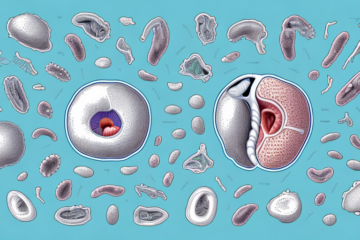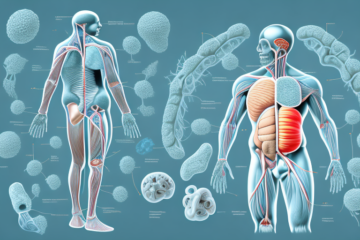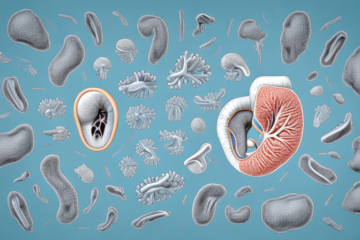The thymus gland plays a crucial role in the immune system, and it’s often overlooked when discussing overall health. However, this gland located behind the sternum is responsible for the production, maturation, and differentiation of T cells in our body. These cells are essential in protecting us against infections, foreign substances, and cancer cells. In this article, we’ll dive into the structure and function of the thymus gland, its disorders and diseases, and ways to maintain optimal health.
The Role of the Thymus Gland in the Immune System
The immune system is a complex network of cells, tissues, and organs designed to protect the body from harmful substances. Within this system, the thymus gland is responsible for the production and maturation of T cells. T cells are a type of white blood cell that plays a critical role in cell-mediated immunity – the process by which our immune cells protect us from harmful pathogens and cancer cells. T cells provide long-lasting protection by recognizing and destroying infected cells, cancer cells, and other foreign substances.
Interestingly, the thymus gland is most active during childhood and adolescence, and gradually decreases in size and function as we age. This decline in thymus function is thought to contribute to the increased susceptibility to infections and cancer that is observed in older adults. However, recent research has shown that it may be possible to rejuvenate the thymus gland and restore its function, potentially leading to improved immune function and better health outcomes in older adults.
Location and Structure of the Thymus Gland
The thymus gland is a small gland located behind the sternum and in front of the heart. It’s a unique gland since it is only active during the early stages of human life. The thymus gland is shaped like a butterfly and divided into two lobes. Each lobe is further divided into several smaller lobules, which contain immune cells and blood vessels. The gland contains a dense network of cells called thymocytes, which mature into T cells.
The thymus gland plays a crucial role in the development of the immune system. It produces hormones that stimulate the maturation of T cells, which are important for fighting infections and cancer. As we age, the thymus gland gradually shrinks and becomes less active, which can lead to a decline in immune function. However, recent research has shown that it may be possible to regenerate the thymus gland and restore immune function in older individuals.
Development and Maturation of T Cells Within the Thymus Gland
The thymus gland is essential for the development and maturation of T cells. During fetal development, the thymus gland is the first organ to develop and starts to produce immune cells as early as the eighth week of gestation. Once produced, T cells migrate to the thymus gland, where they undergo a process called thymic selection. During this process, the T cells are matured, and those that recognize the body’s tissues are eliminated, leaving only those that can recognize foreign substances.
After thymic selection, the mature T cells leave the thymus gland and enter the bloodstream, where they circulate throughout the body, ready to recognize and attack foreign substances. However, not all T cells that leave the thymus gland are fully matured. Some T cells require further maturation in peripheral tissues, such as the lymph nodes and spleen, before they can function effectively.
In addition to its role in T cell development, the thymus gland also plays a role in the endocrine system. It produces hormones, such as thymosin, which are involved in the development and function of the immune system. Thymosin has been shown to stimulate the production of T cells and enhance their function, making it a potential therapeutic target for immune-related disorders.
Disorders and Diseases Associated with the Thymus Gland
Several disorders are associated with the thymus gland, including thymoma, myasthenia gravis, and DiGeorge syndrome. Thymoma is a rare type of cancer that occurs in the thymus gland. Myasthenia gravis is an autoimmune disorder that affects the thymus gland and causes muscle weakness. DiGeorge syndrome is a rare genetic disorder that affects the development of the thymus gland, leading to immune system deficiencies.
In addition to these disorders, recent studies have also linked the thymus gland to the development of autoimmune diseases such as rheumatoid arthritis and lupus. The thymus gland plays a crucial role in the development and regulation of T-cells, which are responsible for identifying and attacking foreign substances in the body. When the thymus gland is not functioning properly, it can lead to an imbalance in the immune system and the development of autoimmune diseases.
The Connection Between the Thymus Gland and Autoimmune Diseases
The thymus gland plays a critical role in preventing autoimmune diseases. When T cells are matured in the thymus gland, they are screened for their ability to recognize and attack foreign substances while not attacking the body’s own tissues. However, in some instances, T cells escape this screening, leading to autoimmune diseases like multiple sclerosis, rheumatoid arthritis, and type 1 diabetes.
Recent studies have shown that certain environmental factors can also affect the function of the thymus gland and increase the risk of autoimmune diseases. Exposure to toxins, infections, and stress can all impact the development and function of T cells in the thymus gland, leading to an increased risk of autoimmune diseases. Therefore, it is important to maintain a healthy lifestyle and minimize exposure to environmental factors that can harm the thymus gland and increase the risk of autoimmune diseases.
The Importance of Maintaining a Healthy Thymus Gland
Maintaining a healthy thymus gland is crucial for a robust immune system. Research has shown that as we age, the thymus gland shrinks and produces fewer T cells, making us more susceptible to infections, autoimmune diseases, and cancer. Fortunately, there are a few ways to support optimal thymus gland health, including exercising regularly, reducing stress, and eating a balanced diet rich in vitamins and minerals.
Another way to support thymus gland health is by getting enough sleep. Studies have shown that sleep deprivation can negatively impact the immune system, including the thymus gland. Aim for 7-8 hours of quality sleep each night to give your body the rest it needs to function properly.
In addition, avoiding toxins and pollutants can also help maintain a healthy thymus gland. Exposure to chemicals and pollutants can damage the immune system and lead to thymus gland dysfunction. Be mindful of the products you use in your home and try to limit exposure to environmental toxins as much as possible.
Treatments and Therapies for Thymus Gland Disorders
Several treatments and therapies are available for thymus gland disorders. These may include medications, surgery, and radiation therapy. For example, surgery may be used to remove a thymoma, while medications like corticosteroids and immunosuppressants can reduce symptoms in those with myasthenia gravis. It’s essential to consult with a medical professional if you suspect you have a thymus gland disorder.
In addition to traditional treatments, alternative therapies such as acupuncture, massage, and herbal supplements may also be beneficial for managing symptoms of thymus gland disorders. However, it’s important to discuss these options with a healthcare provider before trying them, as they may interact with other medications or treatments. Additionally, lifestyle changes such as stress reduction techniques and a healthy diet may also help improve overall health and manage symptoms.
Age-Related Changes in the Function of the Thymus Gland
As mentioned earlier, the thymus gland undergoes age-related changes that impact its function. As we age, the gland becomes less active, and fewer T cells are produced, leading to a weaker immune system. However, studies have shown that regular exercise can slow down the decline of T cell production in the thymus gland, highlighting the importance of an active lifestyle in preserving optimal health.
In addition to regular exercise, certain dietary changes can also help support the function of the thymus gland. Foods rich in vitamins C and E, such as citrus fruits, berries, and nuts, have been shown to enhance T cell production and function. Additionally, reducing stress levels through practices such as meditation or yoga can also have a positive impact on the thymus gland and overall immune system health.
The Link Between Stress and Thymus Gland Function
Stress has a significant impact on our immune system, including the thymus gland. Research has shown that chronic stress can lead to significant changes in the thymus gland’s function, leading to a decrease in T cell production. Therefore, managing stress through practices like meditation, yoga, and deep breathing can improve thymus gland function and support overall health.
In addition to stress management techniques, there are other ways to support thymus gland function. One of the most effective ways is through proper nutrition. Eating a diet rich in vitamins and minerals, particularly vitamins C and E, can help support the thymus gland and boost immune function.
Another factor that can impact thymus gland function is age. As we age, the thymus gland naturally shrinks and produces fewer T cells. However, research has shown that regular exercise can help slow down this process and support thymus gland function in older adults.
Nutritional Support for Optimal Thymus Gland Health
A healthy diet is essential for maintaining optimal thymus gland health. Nutrients such as vitamin C, vitamin E, zinc, and selenium have been shown to support thymus gland function. Additionally, a diet rich in fruits, vegetables, whole grains, and lean proteins can provide the necessary nutrients for optimal immune function.
It is also important to limit the intake of processed foods, saturated fats, and sugars, as they can have a negative impact on thymus gland health and immune function. In addition to a healthy diet, regular exercise and stress management techniques such as meditation or yoga can also support thymus gland health and overall immune function.
Research Advances in Understanding the Role of the Thymus Gland
Advances in research are continually shedding new light on the thymus gland’s role in our immune system and overall health. One promising area of research is thymus gland regeneration. Researchers are exploring ways to regenerate the thymus gland to increase T cell production and promote stronger immune function. This research could have significant implications for the prevention and treatment of autoimmune diseases, infections, and cancer.
Another area of research is focused on understanding the thymus gland’s role in aging. As we age, the thymus gland shrinks and produces fewer T cells, which can weaken our immune system. Researchers are investigating ways to slow down or reverse this process, potentially leading to improved immune function in older adults.
Additionally, recent studies have shown that the thymus gland may play a role in the development of allergies. Researchers have found that individuals with allergies have a smaller thymus gland compared to those without allergies. This discovery could lead to new treatments for allergies and a better understanding of the immune system’s role in allergic reactions.
Conclusion
In conclusion, the thymus gland plays a crucial role in our immune system’s function, and its health impacts our overall health. By understanding the importance of this often-overlooked gland and implementing healthy lifestyle practices, we can support optimal thymus gland function and promote optimal health.
It is important to note that certain factors can negatively impact thymus gland function, such as stress, poor nutrition, and exposure to toxins. Therefore, it is crucial to prioritize self-care practices that support overall health, such as regular exercise, a balanced diet, and stress management techniques.
Additionally, research has shown that certain herbs and supplements, such as echinacea and zinc, can support thymus gland function and boost immune system health. However, it is important to consult with a healthcare professional before incorporating any new supplements into your routine.










